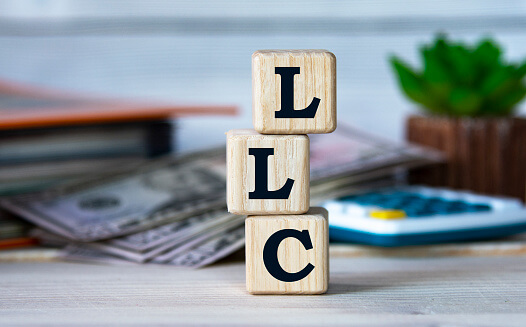Creating an LLC is crucial for protecting personal assets and enhancing business credibility. An LLC offers limited liability protection, meaning personal assets are not at risk for business debts. It's ideal to form an LLC when your business income increases, you have multiple partners, or you want to separate personal and business finances. Key steps include choosing a business name, filing articles of organization, and obtaining an EIN. Consider tax implications and consult a legal advisor. Forming an LLC early can prevent future legal and financial complications, ensuring your business is well-structured and compliant.
Limited Liability Company — or LLC — sounds more formal than anything your small business could ever need. But whether you've been in business for a while or you're just starting out, as a sole proprietor you may form an LLC (or limited liability corporation) easily, without taking too much time or incurring much expense, and with significant benefits.
Here’s what you need to know about when to start an LLC, the advantages (and disadvantages) of converting your business to an LLC, and how to go about doing so.
Note: If you are a small business owner that needs help with invoices, contracts, proposals and taxes, try Bonsai Tax. Our all-in-one software streamlines those burdens so you can focus on growing/scaling your business. Try a 7-day free trial today.

When Should You Create A Limited Liability Company (LLC)?
An LLC is a business structure that protects its owners (or members) from being liable for claims against the business. This legal protection shields the LLC’s owners’ personal property from creditors seeking payment for the LLC’s debts, as well as from claims (such as for personal injuries) filed against the business.
When you form an LLC, you create a legal wall around your personal assets, but that personal liability protection doesn't change the way the business’ income is managed or taxed: for tax purposes, LLC’s remain pass-through businesses, just like a partnership, small businesses, or sole proprietorships.
As a business entity, the income the LLC generates passes through to its owners or investors and is taxed at their personal tax rate.
When a business owner has personal liability protection, they can't be held personally responsible if the business suffers a loss. This means personal assets (car, house, and bank account) are protected. If your business already earns a profit or if it carries any risk of liability, you should start an LLC immediately.
Many folks say you should form an LLC once you earn over $100,000. However, many lawyers insist you start an LLC from the get-go.
An LLC could help reduce the risk of your personal belongings being sought after. On top of that, it would be harder to transition your accounts and contracts from your name after you make the change. If you live in a State where creating a business entity does not cost much, you should consider the extra layer of protection.
Put simply, a sole proprietorship is useful for a low-profit and low-risk businesses. A sole proprietorship doesn't protect your personal belongings. When starting a business, an LLC is the best choice for most small business owners because they can protect your personal assets.
How are LLCs Taxed?
Unlike corporations, an LLC’s taxes are filed via its owner's (or owners’) personal income tax return. There's no such thing as an IRS form for Limited Liability Corporations. Once an LLC is formed, owners report profit or loss on their 1040, as they always have.
Different types of LLCs have their own tax processes:
- Single-member LLCs file a 1040 using Schedule C
- Multi-member LLC members each file a 1040
- LLCs operating as corporations use Form 1120 and send out a Schedule K-1 detailing each member’s LLC profit and loss share. Each then completes their 1040, attaching Schedule E
As is true of sole proprietorships, LLC members are considered self-employed and must pay self-employment tax.
Your state may impose its own LLC taxes based on your business’ income, or annual registration fees, renewal fees, or franchise taxes. Though these fees are generally nominal, it's still important to investigate requirements to cut the risk of fines.
Can Anybody Form an LLC?
If a business offers professional services (i.e., attorneys, physicians, or CPAs), the LLC is referred to as a PLLC, or Professional Limited Liability Corporation.
There are a few types of businesses, including banks and insurance companies, that aren't permitted to form an LLC, but beyond that there are few restrictions. Foreign entities can establish LLCs, and so can corporations and other LLCs.

What Are the Advantages of Forming an LLC?
LLC’s are essentially hybrid entities, offering the advantages of being taxed and operating like a sole proprietorship or partnership while providing the personal liability protection enjoyed by corporations. The benefits you get when you form an LLC can be boiled down to five key aspects:
Eliminating liability concerns
As the name suggests, one of the key benefits to a Limited Liability Company is that it makes your business an entity operating separate and apart from you. Your bank account and personal assets are protected from the business' creditors and other claimants.
The protection provided an LLC contrasts with sole proprietorship or general partnerships, where owners’ personal assets (including homes and savings accounts) are at risk of being liquidated to pay the business’ debts.
Independence
For many business owners, the main driver to starting a business was no longer taking orders from a boss. Unlike corporations, a business owner who operates an LLC continues running their business without having to answer to shareholders for decisions they make. This is especially true if you form a single member LLC.
If you're concerned about issues of control regarding an LLC with multiple owners, you may include specific responsibilities within your LLC operating agreement to restrict others’ ability to overrule you.
Pass Through Tax Treatment
When business owners opt for a corporate structure, they get taxed on income they receive as shareholders and the corporation gets taxed too. By contrast, an LLC is able to treat profits the same way sole proprietors do — as pass-through income to be reported on their individual tax return, taxed at their individual tax rate. This holds true no matter the LLC structure, including partnerships and S corporations.
Note: If you want the best way to save money on your taxes, try Bonsai Tax. Our app can scan your bank/credit card statements to discover potential tax write-offs and save you thousands of dollars from your tax bill. In fact, users typically save $5,600. Claim your 7-day free trail today.
Minimal paperwork
Though Limited Liability Corporations are offered many advantages enjoyed by corporations, they don't have the same administrative requirements. Though state dependent requirements exist, the formation of an LLC is generally a straightforward process.
Some states even waive the need to file the operational agreements others required. The most universal requirements include registering a business name and paying fees to the appropriate state office.
Choose your own profit-distribution plan
As an LLC, you have incredible flexibility in managing your profits. Sole proprietors who decide to shift to single-member LLC entities can continue exactly as in the past, continuing to enjoy 100 percent of their profits as income.
Though LLCS do have to comply with IRS rules requiring that distributions reflect genuine ownership interests and economic circumstances, beyond that they are generally free to divide profits among members based on ownership proportion or whatever distribution structure they agree to.
This is far different from partnerships, whose distributions are shared equally, or corporations which usually pay dividends based on ownership interest.
What Are the Disadvantages of Forming an LLC?
While you consider forming an LLC versus sole proprietorship, keep in mind that downsides do exist.
Piercing the corporate veil
Companies that opt for an LLC structure to protect their assets from liability may see those protections disappear if they aren’t careful about separating personal transactions from business transaction. The same is true if they're found to have perpetrated fraud or to have been negligent.
Consider the tax outcomes over a sole proprietorship
If you're operating a sole proprietorship you're already used to paying self-employment taxes, but members new to your LLC may be shocked to find themselves paying Social Security and Medicare taxes based on the business’ income. By contrast, if you form your LLC as an S corporation, owners will still have to pay the tax, but only on their compensation.

Dissolution Based on Member Departure
As a sole proprietor, you're the master of all that goes on within your business and the only one who can make the decision to dissolve the business.
By contrast, LLC existence is subject to the whims of its members: if one leaves (whether by choice, as a result of bankruptcy, due to disability, or death), the entire structure falls apart. This not only leaves all remaining members responsible for the entity’s obligations, but also means that the entire structure needs to be reestablished.

How to Form a Limited Liability Corporation
An LLC isn't difficult to establish. In fact, the rules around LLC formation are so simple you may be able to lower your cost by filing on your own. Read our guide to LLC costs. Though your state may have its own requirements, the basics are universal, and as a sole proprietor you may have already taken care of some of the basic steps.
They are:
1. Choose and register your LLC’s business name
Your name needs to be unique, so you’ll have to check to make sure it hasn’t already been taken. There are several resources available to do this, but the most reliable is usually online websites.
You’ll need to check on every state in which you do business. Once you’ve identified a name, you need to register it. There is generally a nominal fee for registration.
Some states also require that LLCs obtain business licenses or permits, while others require that owners publish a public notice indicating their intention to file Articles of Organization.
2. Identify and select a registered agent
Every LLC has to designate a registered agent that will receive official correspondence on its behalf. This agent may be somebody associated with your company, or a third-party company that offers to receive legal mail as a service. This individual or company’s name and address will be included on your articles of organization.
3. Create and file articles of organization
The articles of organization refers to a document that contains your LLC’s identifying information, as well as how it is to be structured.
4. Apply for an Employer Identification Number (EIN)
Unless your LLC does not have employees, you will need to have an Employer Identification Number. This nine-digit number will be referenced within all of your federal tax forms.
5. Craft an operating agreement
Operating agreements contain information about the duties of management, how it is structured, what voting rights exist, and how profits and losses will be distributed. Not every state requires an operating agreement.






